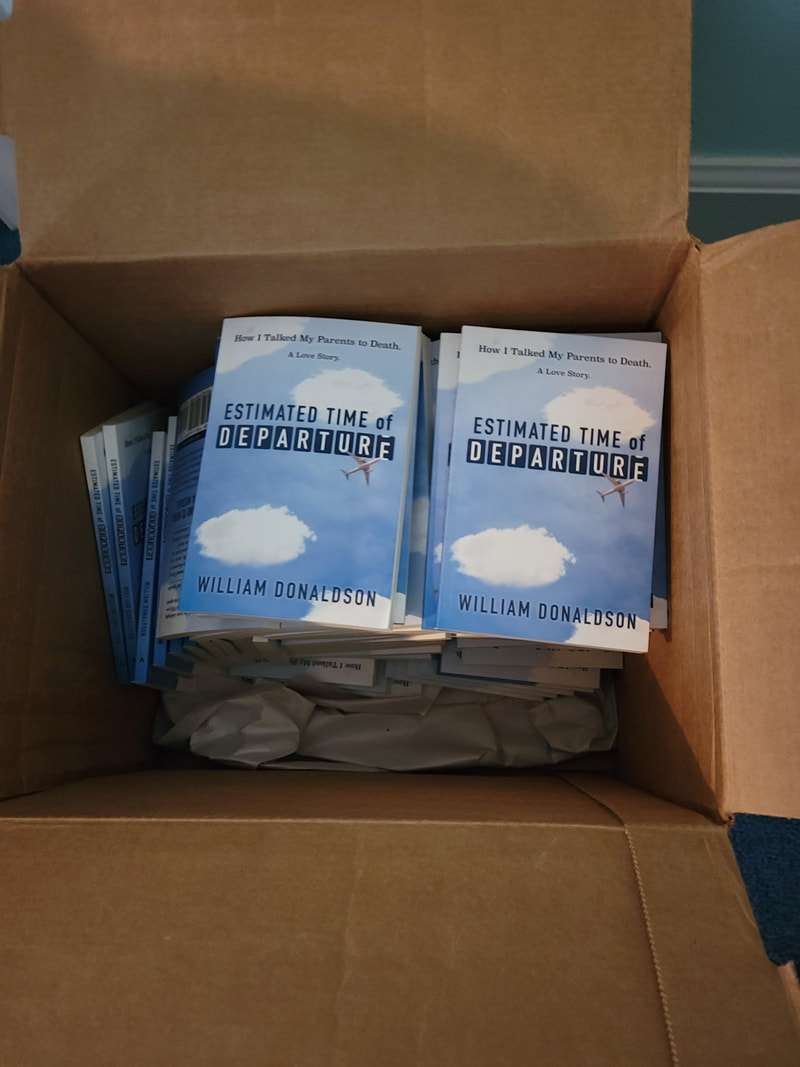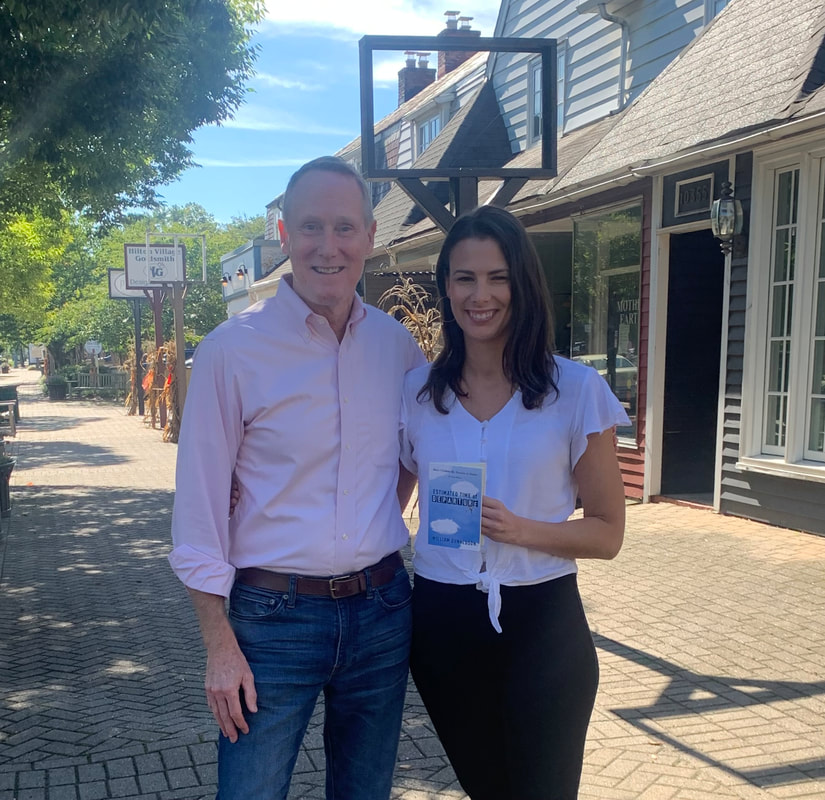|
Willy offers us a beautiful story of this final journey he took with each of his parents. The metaphor of a flight plan and a plane taking off is really apt because if you think about all that has to go into a plane taking flight—all the thousands of people who have enabled that to happen—those who designed and built the plane, air traffic control, the baggage handlers & ground crew, cabin crew, pilots, the TSA, the people keeping the airport clean, —people seen and unseen— every time I get in an airplane I’m amazed at how much of a miracle I am a part of…
The same can be true when someone dies. It’s truly a miracle that we are born and that we live and then we die but it’s also a miracle how many people are often there to help us along the way, at the beginning and especially at the end. At every juncture in Willy’s story, there were professionals and friends, and family members who he turned to for their expertise, for their information, and for their support. Just like getting a plane to take off, each and every one of these people, seen and unseen, played a role in the final outcome. In my work on caregiving, I have found it is often the case that people will respond to a story like Willy’s—where he’s writing about everything he’s been through with his parents--with something like, “bless his heart,” or “what a saint he was.” The truth is that most of the time, caregivers have taken on the role because of birthright, because this is what you do as a son or daughter or spouse or parent or a friend. I worked on a study many years ago looking at caregivers who took on multiple caregiving roles and found that they actually had more positive well-being than non-caregivers—the vast majority embraced the caregiving role and considered themselves very good at it. The problem comes in when those caregivers aren’t able to get the needed support to do their job as caregivers. If you’re a parent, you know what I’m talking about. Dealing with that screaming toddler or out-of-control teenager is actually manageable if you have a supportive partner and flexible employer and access to a counselor or healthcare as needed. One of the strongest predictors of having to place a loved one in a nursing home is a caregiver who is completely burned out and lacking in resources. Caregivers who have access to things like respite care or in-home nursing or hospice or support with their own daily needs are able to hold on to the role they cherish—to hold on to that loved one in their own homes where they want them to be. in an article by Mills & friends, marking World Hospice & Palliative Care Day, Leave No One Behind—Equity in Access to Palliative Care, they emphasize those from ethnic and racial minority groups and those with lower socioeconomic status are least likely to be able to access hospice and other palliative care. As we all consider the importance of Willy’s advice to us, please also consider how we can best support pathways to access for all. We can certainly do that in the context of our own families, but consider how we can help others with negotiating these tasks- neighbors, friends, friends of friends….and, don’t forget, of course, how our political decisions can impact how money is spent, and for whom. Finally, let’s remember those who are doing the hard work (the certified nursing assistants, personal care attendants, the hospice nurses, the van drivers) and how we support them in getting paid a living wage with paid sick leave so they, too, will have the ability to care for their loved ones. Willy’s book reminds us that the journey is a long one but is filled with all of those things that make life worth living—the tears, the laughter, the music, the dancing, the hard work, the bourbon (apparently), and the ultimately final rest on a comfortable pillow. Here is a picture of me with my amazing publisher, Bethany Marshall. Bethany is holding the first physical copy of Estimated Time of Departure. Reinforcements are on the way and we will be fulfilling the Publishizer orders soon. Official launch December 7th. Exciting things ahead. Stay tuned.
Here is a wonderful guest post from my friend, end-of-life caregiver, and death doula Anna Marshall. “We all die. When is out of our control. This is a good how.” - Indra, The 100
For most of us, contemplating death and dying is not an easy thing to do. However, if we approach the topic with a posture of courageous vulnerability and humble honesty, considering our lives in the light of our mortality can be a profoundly rewarding practice, as it draws us closer to the miracle of existence and the heart of our own human experience. We tend to avoid thinking about the end of our lives for all kinds of reasons. Either we are too busy living, or we assume our loved ones will be able to handle the details when the time comes, or we simply do not like thinking about it. Considering our death may cause us to reconsider how we are living life and perhaps we are not ready for that kind of reckoning. And yet, end-of-life decisions are still life decisions, and they must be made at some point, by someone. Why not us? Why not begin now? When making end-of-life decisions, there are, of course, many details to think through and decisions to make. My friend, Willy, in his book Estimated Time of Departure, identifies two types of decisions that we all face at the end of life. There are the biological (medical and legal) decisions and the biographical (emotional and relational) ones. When facing either kind, one helpful thing we can do is identify the core values that shape our lives and allow those values to serve as a compass to navigate our experiences at the end of life. There are many questions we can ask to peel back the layers of our relationship with life and death and bring our values to light. Here are a few to start with:
Your responses to these questions may change over time, and that is perfectly okay. Use them as prompts to check in with yourself on occasion and to invite others into an on-going conversation with you on this topic. Think about them, write about them, talk about them. Consider them in whatever way best serves you where you are. With love and grace for the journey, Anna Marshall End-of-Life Caregiver and Death Doula I first met Willy when he graciously accepted a meeting with me regarding a venture I was working on at the time. I heard of him as a notable professor with great experience in entrepreneurship and systems thinking. He was kind, humble, and eager — and listened to my ideas free of judgment, with an open mind.
With his inquisitive nature, Willy quickly discovered my work in publishing. Shortly after this meeting, he shared with me that he had been working on a book that was of great importance to him. We quickly planned to meet again, this time for me to learn about his book. As we met over lunch, he shared with David Hancock (my mentor and the founder of Morgan James Publishing) and myself a stunning story of how he navigated the challenges that came with end-of-life stages and his parent's death, and the lessons learned along the way. I was intrigued. Of course, as prolific as he is, Willy also had a business book in the works, which ended up being a perfect fit at the time for Morgan James, and we quickly went on to work with him in the publishing of his first book, Simple_Complexity (Morgan James 2017). His passion for his first project never faded, however, and a couple of years later, it was time to re-open the conversation about his other book, Estimated Time of Departure. We were in the early stages of the pandemic when uncertainty, loss, and grief were present in our world in unprecedented ways. It finally seemed to be time to bring this book and the wisdom within to life. The way we face death, both individually and as a society, matters in powerful ways. In our present-day, aging is dreaded instead of honored. We are quick to avoid the topic of death. Our end-of-life care systems are structured poorly. Our elders are often treated in neglectful, careless ways. I believe we must evaluate and heal our approach as a collective to help restore dignity and reverence to those in this stage of life. Estimated Time of Departure also provides an opportunity for us all to ponder our own personal end-of-life choices and to have meaningful dialog around the topic with loved ones. Willy's work is a prompt to have these difficult conversations. It offers a lesson on facing the inevitable with grace, not fear. And most importantly, it serves as a reminder to cherish the moments we share with our loved ones and make a pointed effort to choose love above all. This is my hope for readers and the reason I am publishing this book. The topic of death is never easy, especially when it comes to those closest to us. In his latest book, Willy offers his experience and wisdom in a way that is relatable, poetic, and approachable — Estimated Time of Departure is a true gift. Bethany Marshall, Aitia Press |
AuthorWilly is an educator, author, businessman, systems thinker, husband, father, friend, and son who likes to think deeply and longitudinally about ideas big and small. Categories |
Join Willy’s Email list |
Estimated Time of Departure
|



 RSS Feed
RSS Feed